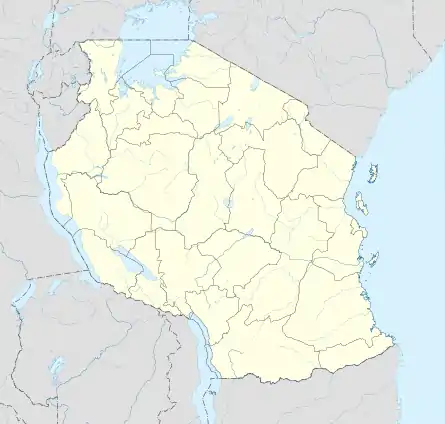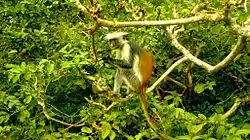Jozani
Jozani is a village on the Tanzanian island of Unguja (Zanzibar Island). It is located in the southeast of the island, 3.1 miles (5 km) south of Chwaka Bay, close to the edge of the Jozani-Chwaka Bay National Park.[2] It is primarily a farming community of about 800 people.[3] located 21.7 miles (35 km) south-east of Zanzibar Town off the road leading to Paje, Zanzibar. It is easily reached by public buses 309 and 310, by chartered taxi or as an organized tour from Zanzibar Town. These tours are often in combination with dolphin observation in Kizimkazi,[4] one of Zanzibar's oldest settlements with a tiny 12th century mosque open to public.[5] The main road on the island, connecting the west and east coasts of Zanzibar, also connects to Jozani. Besides public bus routes 9, 10 and 13, you can also get here from Zanzibar Town by dala-dala number 309, 310, 324, and 326.[6] Jozani is a small and rural village, situated in the innermost part of the Pete Inlet Bay, immediately south of the Jozani Chwaka Bay National Park. It is one of six rural villages surrounding the park. Residents here depend to a large degree on the Jozani Forest as a source of firewood, hunting, building resources, farming, fishing, and more. The village also operates ecotourism in the Jozani Forest and has constructed a 0.6 mile (1 km) boardwalk through the mangroves at the southern road entrance into the national park. Many villagers work as authorized guides for tours in the southern tip of Jozani Forest.[7]
Jozani | |
|---|---|
Village | |
 Jozani Jozani within Tanzania | |
| Coordinates: 6°16′S 39°25′E | |
| Country | |
| Region | Zanzibar Central/South Region |

References
- Finke, Jens (2010). The Rough Guide to Tanzania. Penguin Guides. Page 463. ISBN 9781405380188.
- Finke, J. (2006) The Rough Guide to Zanzibar (2nd edition). New York: Rough Guides.
- International Atomic Energy Agency (1997). IAEA Yearbook 1997. University of Michigan.
- Fitzpatrick, Mary and Tim Bewer (2009). East Africa. Lonely Planet. Page 142. ISBN 9781741047691.
- Ndembwike, John (2010). Life in Tanzania Today and Since the Sixties. Intercontinental Books. Page 52. ISBN 9789987932245.
- McIntyre, Susan and Chris (2013). Zanzibar. Bradt Travel Guides. Page 330. ISBN 9781841624587.
- Zeppel, Heather (2006). Indigenous Ecotourism: Sustainable Development and Management. CABI. Page 139. ISBN 9781845931254.